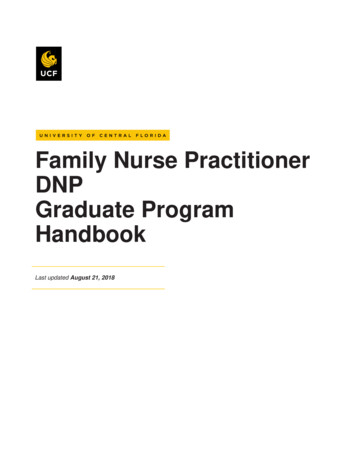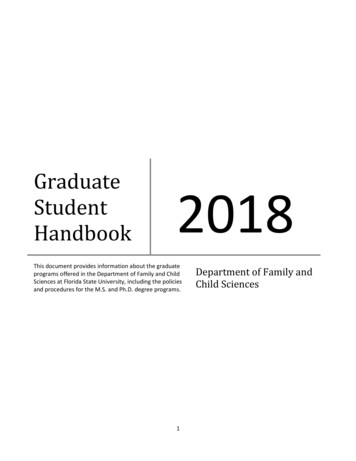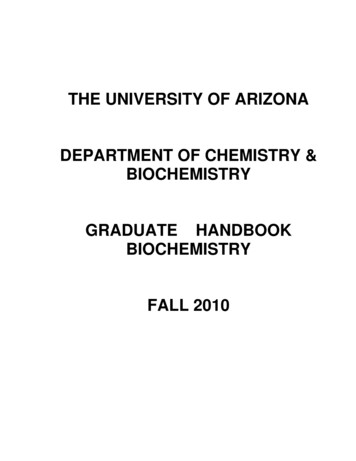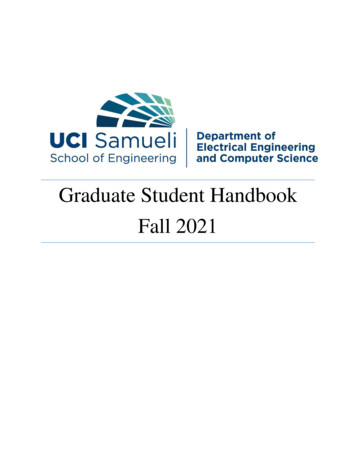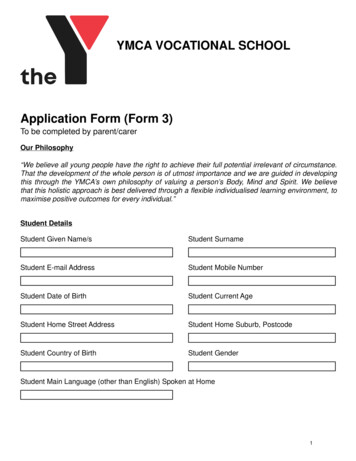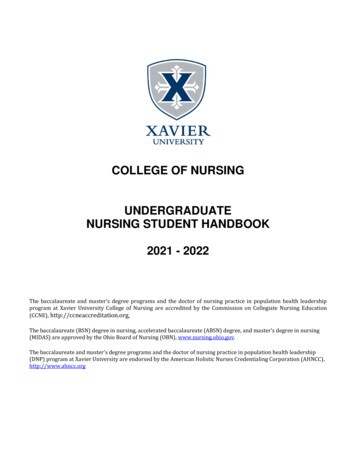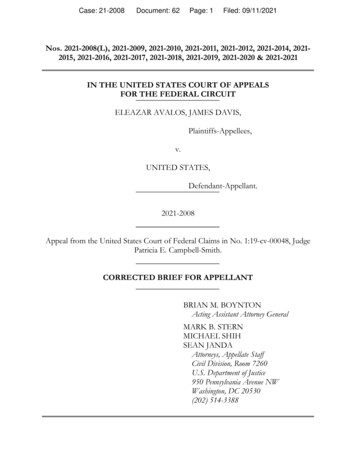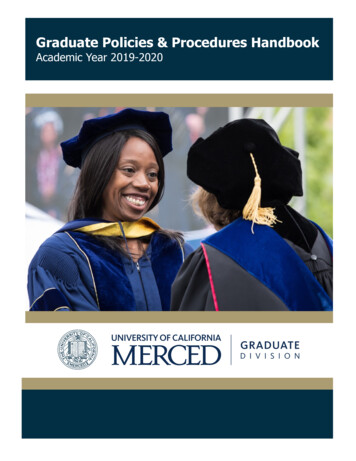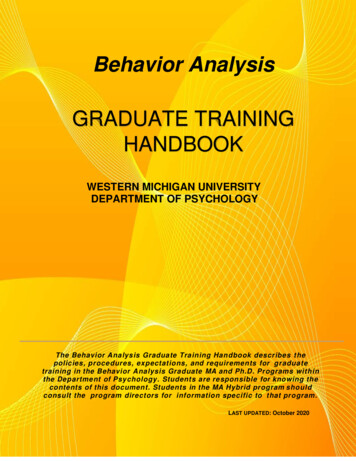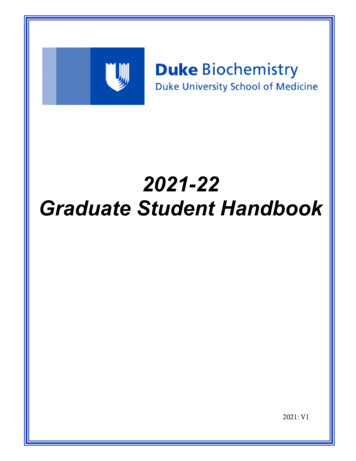
Transcription
2021-22Graduate Student Handbook2021: V1
TABLE OF CONTENTSWELCOME TO DUKE BIOCHEMISTRY6MISSION STATEMENTFACULTY EXPECTATION FOR THE COMPLETION OF A PH.D. DEGREE66TIMELINE TO DEGREE FOR BIOCHEMISTRY PH.D. STUDENTS6DEPARTMENT CONTACTS7BIOCHEMISTRY GRADUATE STUDIES OFFICE (BGSO):7BIOCHEMISTRY DEPARTMENT ADMINISTRATIVE OFFICE:7OFFICE RESOURCES AND ACCESS:8ROOM RESERVATIONS9FINANCES, VACATION & HEALTH INSURANCE10FINANCIAL SUPPORT SUMMARY AND DISBURSMENT10RECREATION FEE10RESEARCH ASSISTANTSHIP STIPEND PAYMENT SCHEDULE:TAXES1011GRADUATE STUDENT VACATION & SICK LEAVE POLICY11HEALTH AND DENTAL INSURANCE AND HEALTH FEES12DUKE STUDENT HEALTHINDIVIDUALS WITH DISABILITIES1314LIVING IN & AROUND DUKE15HOUSING15PARKING AT DUKE16GRADUATE STUDENT FELLOWSHIPS & FUNDING OPPORTUNITIES17DEPARTMENT OF BIOCHEMISTRY: FELLOWSHIP FOR GRADUATE STUDIES17INTERNAL AND EXTERNAL COMPETITIVE FUNDING OPPORTUNITIES FOR GRADUATESTUDENTS17CONFERENCE TRAVEL AWARDS & FELLOWSHIPS17GRADUATE STUDENT REPRESENTATION, COUNSELING & PEER SUPPORT19BIOCHEMISTRY GRADUATE STUDENT COUNCIL (BGSC)19GRADUATE AND PROFESSIONAL STUDENT GOVERNMENT (GPSG)19OFFICE OF BIOMEDICAL GRADUATE EDUCATION (OBGE)19IDEALS (INCLUSION, DIVERSITY, EQUITY, ADVANCEMENT, AND LEADERSHIP IN THESCIENCES)20BIOCORE (BIOSCIENCES COLLABORATIVE FOR RESEARCH ENGAGEMENT)202
COUNSELING & PSYCHOLOGICAL SERVICES (CAPS)20DUKEREACH21RESOURCES FOR ASSISTANCE21DUKE STUDENT AFFAIRS23CAREER DEVELOPMENT RESOURCES & CERTIFICATESPROFESSIONAL DEVELOPMENT SERIESCURRICULUM ENHANCEMENT PROGRAMMING232323BIOCHEMISTRY DEPARTMENT ANNUAL ACADEMIC & SOCIAL EVENTS25BIOCHEMISTRY DEPARTMENT CORE FACILITIES26CRYO-ELECTRON MICROSCOPY CENTER3D MACROMOLECULAR STRUCTURE ANALYSIS & KINEMAGE2626DUKE MAGNETIC RESONANCE SPECTROSCOPY CENTER26X-RAY CRYSTALLOGRAPHY CENTER26ANNUAL TIMELINES FOR BIOCHEMISTRY STUDENTS2021/2022 IMPORTANT DATES FOR 1ST YEAR GRADUATE STUDENTS (G1)27272021/2022 IMPORTANT DATES FOR 2YEAR BIOCHEMISTRY STUDENTS (G2)272021/2022 IMPORTANT DATES FOR 3YEAR BIOCHEMISTRY STUDENTS (G3)28NDRD2021/2022 IMPORTANT DATES FOR 4 YEAR BIOCHEMISTRY STUDENTS (G4)2021/2022 IMPORTANT DATES FOR 5TH YEAR BIOCHEMISTRY STUDENTS (G5 )28282021/2022 IMPORTANT DATES FOR THE DISSERTATION & DEFENSE29THTHE FIRST YEAR (G1)302021/2022 IMPORTANT DATES FOR 1ST YEAR GRADUATE STUDENTS (G1)30LAB ROTATIONS30OBGE TRAINEE TRACKING TOOL (T3) - CREATING A T3 PROFILE30CHOOSING A RESEARCH ADVISOR31COURSEWORK & REGISTRATION31THE SECOND YEAR (G2)322021/2022 IMPORTANT DATES FOR 2ND YEAR BIOCHEMISTRY STUDENTS (G2)32SUPERVISORY COMMITTEE SELECTIONTHE INITIAL COMMITTEE MEETING (“PRE-PRELIM”)3233DEVELOPMENT OF INITIAL INDIVIDUAL DEVELOPMENT PLAN (IDP)34TEACHING34THE THIRD YEAR (G3) – PRELIMINARY EXAM2020/2021 IMPORTANT DATES FOR 3RDYEAR BIOCHEMISTRY STUDENTS (G3)3535SCHEDULING THE ORAL PRELIM EXAMINATION35WRITTEN PRELIM PROPOSAL SUBMISSION & APPROVAL CHECKLIST363
WRITTEN FORMAT OF THE PRELIM EXAM PROPOSAL DOCUMENT37GENERAL PRELIM EXAM INFORMATION:37WRITTEN PRELIM EXAM CONTENT REQUIREMENTS38ORAL PRELIM EXAM40RE-TAKING THE PRELIMINARY EXAM40THE FOURTH YEAR & BEYOND (G4 )412021/2022 IMPORTANT DATES FOR 4TH YEAR BIOCHEMISTRY STUDENTS (G4)412021/2022 IMPORTANT DATES FOR 5TH YEAR BIOCHEMISTRY STUDENTS (G5 )41ANNUAL PROGRESS MEETINGSCHANGES TO THE SUPERVISORY COMMITTEE4142REQUIRED EXTENSION REQUEST FOR G8 STUDENTS42THE DISSERTATION SEMINAR & DEFENSE432021-22 IMPORTANT DATES FOR THE DISSERTATION & DEFENSECHANGES TO THE SUPERVISORY COMMITTEE4344SCHEDULING YOUR DISSERTATION SEMINAR & DEFENSE44BIOCHEMISTRY GUIDE TO GRADUATION45ADDITIONAL INFORMATION ABOUT ELECTRONIC THESES AND DISSERTATIONS (EDTS)46ADDITIONAL INFORMATION FOR GRADUATES47REQUIREMENTS FOR THE MASTER’S DEGREES49RESPONSIBLE CONDUCT OF RESEARCH (RCR)51FIRST YEAR51SECOND AND THIRD YEARSFOURTH YEAR5151FIFTH YEAR AND BEYOND52RCR RESOURCES52RESOURCES FOR INTERNATIONAL STUDENTS53INTERNATIONAL HOUSE53VISA SERVICES OFFICE53WEBSITE53ENGLISH FOR INTERNATIONAL STUDENTS (EIS)APPLYING FOR A SOCIAL SECURITY NUMBER (SSN OR INDIVIDUAL TAX IDENTIFICATIONNUMBER (ITIN)53APPENDIX I: COURSES OF INTEREST TO BIOCHEMISTRY GRADUATE STUDENTS5455BIOCHEMISTRY DEPT COURSES, FALL SEMESTER55FALL COURSES OFFERED BY OTHER DEPARTMENT IN THE BIOMEDICAL SCIENCES564
BIOCHEMISTRY DEPT COURSES, SPRING SEMESTER58OTHER POPULAR SPRING COURSES FOR BIOCHEMISTRY STUDENTS60APPENDIX II THE DUKE GRADUATE STUDENT RESOURCES62APPENDIX III CERTIFICATE IN COLLEGE TEACHING65APPENDIX IV. INDIVIDUAL DEVELOPMENT PLAN (IDP)675
*DISCLAIMER: THIS HANDBOOK IS FOR INFORMATIONAL PURPOSES ONLY AND IS NONBINDING*WELCOME TO DUKE BIOCHEMISTRYThe Duke Department of Biochemistry has a rich history of accomplishments at the cutting-edgesof biological and chemical research. We also contribute to a broad educational mission, trainingand teaching undergraduate, graduate and medical students. Currently, the Departmentcomprises 20 primary and 13 secondary faculty members, 7 active emeritus members, 2 adjunctmembers and 50 graduate students and 45 postdoctoral researchers and staff scientists. Weoccupy approximately 42,000 square feet of the Nanaline Duke Building and 5,000 square feet ofthe adjacent Sands Building.Mission StatementThe mission of the Duke University Biochemistry Graduate program is to educate and mentorstudents from diverse background in the fundamentals of biochemical principles and practicethough courses and research by (1) guiding students in their thesis research project, and (2)preparing them for a career in research, education, or other disciplines. The program promotes acommitment to excellence in research scholarship and fosters a spirit of creativity, service, andrespect, within an environment that is ethical, inclusive, and diverse.Faculty Expectation for the Completion of a Ph.D. DegreeTo earn the Ph.D. degree in Biochemistry, the Department Faculty expect each graduate studentto produce an independent body of original, high-quality scientific work. Thoughcircumstances vary, this work will result in authorship on typically two peer-reviewed publications,including those on which the student is first author, prior to or soon after graduation.Timeline to Degree for Biochemistry Ph.D. StudentsStudents begin their graduate studies (G1) exploring different areas of research and mentoringstyles with at least 3 hands-on rotation research projects. Trainees learn about the department’savailable and ongoing research projects through the introductory faculty talks during Orientation,as well as from our retreat and informal 1-on-1 meetings between students and mentors. In Springof their 1st year, G1 students either choose a thesis lab (with permission from the mentor and thedepartment) or continue with rotations until settling into a thesis lab. Students must also complete24 graded coursework credits by the end of G2 (with the exception of students coming in with aMaster’s or as part of the MSTP program). Students typically complete the 1 semester teachingassistant (TA) requirement during G2.The Preliminary Examination for candidacy must be completed by the end of the student’s thirdyear (G3) and expires after five years (G8). Extensions of the Preliminary Exam deadline must beapproved by the DGS and Associate Dean for Academic Affairs. Students who have not completedtheir Preliminary Examination by the end of G4 will be withdrawn.Dissertation examinations are expected by the end of graduate year seven (G7) and must becompleted by the end of graduate year eight (G8). For students who are in G8 prior tograduation, the annual progress report and a plan for dissertation completion must be approvedby the student, committee chair, and DGS and submitted to the Associate Dean for AcademicAffairs.6
Department ContactsBiochemistry Graduate Studies Office (BGSO):The DGS and DGSA serve as advocates for graduate students and should be approached withany school-related and/or personal concerns. Issues will remain confidential according touniversity policy guidelines. Students may meet with the DGS and/or DGSA during their regularoffice hours or can schedule an appointment.Dr. Meta Kuehn, Director of Graduate Studies (DGS) – The DGS is the official departmental orprogram administrator of the rules and regulations of the Graduate School, the designatedadvocate of the needs of the graduate program and graduate students within the department andin the University, and the advisor of all matriculating graduate students prior to research groupaffiliation.DGS: Meta Kuehn, PhDOffice: Room 220A Nanaline DukePhone: 919-684-2545Email: kuehn@duke.eduAmy Norfleet, Assistant to Director of Graduate Studies (DGSA) – The DGSA providesassistance with all graduate issues outside of the actual study of Biochemistry including:registration, payroll, financial aid, visa services, health insurance, parking, program requirements,exam scheduling, room reservations, counseling, etc.DGSA: Amy NorfleetOffice: Room 251 Nanaline DukePhone: 919-681-8770Email: norfleet@duke.eduBiochemistry Department Administrative Office:Dr. Richard Brennan, Biochemistry Chair – The Biochemistry Chair is the official link betweenthe department and the dean. The Chair leads the department in planning, recommends allocationof space, and is responsible for budget preparation, annual faculty evaluations also includingpromotion and tenure, assignment of academic and nonacademic staff, assignment of teachingloads and student advising, and adherence to departmental bylaws.BCH Chair: Dick Brennan, PhDOffice: Room 242A Nanaline DukePhone: 919-684-9471Email: richard.brennan@duke.eduAdministrative Assistant to the BCH Chair: Peggy WilkisonOffice: 255 Nanaline DukePhone: 919-681-8804Email: prw2@duke.eduDepartment Business Manager: Floyd BordenOffice: Room 254A Nanaline DukePhone: 919-684-5326Email: floyd.borden@duke.edu7
Office Resources and Access:DukeID Card and After-Hours Door Access:WebsiteYour first DukeCard is free, and is a requirement. Please see the DGSA prior to getting yourDukeCard. Visit their website for more information and office locations.After-Hours Door Access: You will need a DukeCard with a Proxchip for after-hours door access.If your card does not contain a Proxchip, please see the DGSA. If you have a Proxchip, pleasebring your card to the DGSA and they will request after-hours access to the Nanaline Duke, Sands,Jones, & CARL buildings.Email: Before you arrive on campus for Orientation, you should have received your official DukeNetID email log-in and password. We encourage you to use this account, but should you changeyour email address, please notify the BGSO immediately. You will also use your NetID log-in toregister for classes each semester.Mail: All mail sent to the faculty, staff, department, DGS, BGSO, or Administrative Office mustinclude «Box 3711 Biochemistry» to guarantee delivery.Computers/Printers/Photocopiers/Fax: Computers and printers located in 252 Nan Duke(Biochemistry Student Lounge). The password for these computers is: nd251bc. The departmentalcopier requires a pass code. To use the color copier near the cold room on the 2nd floor of NanDuke (near Oas Lab), please use code 44120. The fax machine is in the BCH AdministrationOffice (255 Nanaline Duke) and is available during office hours. The fax # is 919-684-8885. If youhave a long-distance fax, you will need a fax code that can be obtained from your labmanager/staff assistant.8
Room ReservationsPlease see below for contact information to reserve rooms across campus.ContactAmy Norfleet681-8770norfleet@duke.eduRoom (occupancy)Nanaline Duke Buiding: (1st & 2nd floors)252B Nanaline Duke (25)247 Nanaline Duke (20)147 Nanaline Duke (100-110)209 Nanaline Duke (10)Sands Buiding:279 Sands (18)Jodi Belander684-8085jodi.belanger@duke.eduNanaline Duke Buiding: (3rd & 4th floors)384 Nanaline Duke (25)437/439 Nanaline Duke (25-30)Sands Building:465 Sands (22) – left unlocked472 Sands (18) - lockedJennifer Goins684-3578immunologydept@mc.duke.eduMed Center Room Reservations: 25LiveFor any questions, please call 684-9026 or emailmcedrooms@mc.duke.edu117A Jones (small room)354 Jones (small room)321 Jones (small room)Including:143 Jones (150)103 Bryan Research (190)001 MSRB (70)Learn more about Duke University Event Management9
FINANCES, VACATION & HEALTH INSURANCEThe Duke University Graduate School and the Biochemistry program offer a wide array of financialsupport from annual awards funds, instruction, endowed fellowships, foundations and otherprivate support, as well as federal research and training grants. (Graduate School and UniversityContacts are listed in Appendix II on page 62.)Financial Support Summary and DisbursmentWebsiteFinancial support for continuing Ph.D. graduate students in the Department of Biochemistry istypically provided over a 12-month period. You can find yearly financial support dollar amountsand disbursements on the biochemistry website, along with the tuition charge per semester, paydates, and the change in tuition remission in year 4.Recreation feeThe student recreation fee in the first 5 years of study is paid by the Graduate School for use ofthe campus facilities. For the 2021-22 AY, students beyond G5 must opt in to have this fee paidand for continued access. All 5th year students will receive an email on how to “opt in” at thebeginning of each academic year. If you choose to “opt in”, your student account will be chargeda recreation fee of 158.00 per six-month period (July 1–December 31 and January 1–June 30).The Department has decided to pay this fee for students who choose to opt-in for the 2021-22AY and will be posted directly to your Bursar account. Please notify the DGSA if you are a 5th year student and want to opt-in.Research Assistantship Stipend Payment Schedule:WebsiteBeginning in G3, financial awards will be supported by the PI’s grants & funding and will be paidthrough the monthly faculty staff payroll in 12 equal monthly payments on the 25th day of eachmonth.Please Note: Annual award letters will be sent in May detailing new stipend and fee amounts.Students have ultimate responsibility for ensuring their tuition and fees are paid and shouldregularly review the Bursar’s Office statements and quickly resolve any problems or questions.For questions about bursar accounts, contact the DGSA, the Bursar’s Office, or the GraduateSchool Office of Budgets and Finance.Students must be enrolled in the Graduate School to receive fellowship or assistantship support.Our department works cooperatively with the Graduate School and School of Medicine to ensurefinancial support for six consecutive 12-month academic years, provided the student has madecontinued satisfactory progress in our graduate program.As a member of an outstanding graduate community, we also strongly encourage students toapply for other institutional and outside fellowships. Awards of this type add distinction to yourgraduate record and enhance our ability to support additional highly qualified students in graduateprograms at Duke.Duke@WorkFor those students that are paid on the 25th of each month, you will now have the option ofaccessing your pay statements through the on-line Duke@Work system.10
You can also use Duke@Work to do the following: View current and past pay statements. Change your home address. Update your work address (physical location). Set-up or change bank accounts for direct deposit. Change Federal and North Carolina tax withholding amounts (if required).Please Note: The Duke Payroll system and the Duke Hub system are NOT connected. A change ininformation submitted in one system will not automatically change the same information in the other. If youmake a home address change in Duke@Work, you will need to make the same change in Duke Hub.Duke Corporate PayrollGraduate student stipend payments are distributed from the Duke Corporate Payroll office.Corporate Payroll operates a customer service center which provides the following: issuingpayments for salaries and corresponding benefits, as well as voluntary and involuntarydeductions; fellowship and scholarship payments to Duke students; distributing annual tax forms,IRS Forms W-2, 1042S and 1099 forms; providing wage verification requests for mortgagecompanies or governmental agencies; and offering training for departmental payrollrepresentatives, human resources managers, and business managers. Email corporate Payroll orcall 919-684-2642.TaxesUnder the Tax Reform Act of 1986, both fellowship & assistantship stipends are taxableand are reportable as income with the exclusion of tuition, fees, books and equipment requiredfor educational support. The university has no reporting or withholding requirements onfellowships; however, you may choose to have taxes withheld by completing a W4 form with thepayroll office. We encourage you to read the IRS’ publication concerning Tax Benefits ofEducation and the taxation of scholarships and fellowships, or to consult with your tax advisorconcerning this financial aid package.For U.S. citizens, fellowship stipends may be reduced, for tax purposes, by the amounts paid fortuition, fees, and required books, supplies, and equipment. For general information about thetaxability of scholarships and fellowships see IRS publication 970.For international citizens, stipend payments are subject to withholding of federal and stateincome taxes based on the existing tax treaties between the student's country and the USA. Inaddition, there is an IRS requirement that tuition payments for foreign students must be reportedto the federal government.Please Note: Each student's tax situation is unique, and the Payroll Office at Duke provides assistance toenrolled students regarding withholding requirements.Graduate Student Vacation & Sick Leave PolicyWebsiteThe vacation policy ensures that all Ph.D. Research Assistants (years 3 ) are allowed a minimumamount of paid time off each year, and the policy outlines the request process. This policy appliesonly to Ph.D. RAs, since their research work does not necessarily correspond to the AcademicCalendar. It is expected that Teaching and Graduate Assistants (years 1 & 2), and Duke funded11
fellows, will have ample vacation time during periods when classes are not in session.I. Graduate students who are funded by research projects on a twelve-month stipend scheduleare allowed, at minimum, two weeks (ten working days) of vacation each year. Students whowish to take vacation must apprise their advisor of their intentions at least two weeks beforethe planned absence.II. Students wishing to take additional periods of time off, paid or unpaid, must receive theapproval of their advisor. If payroll changes are necessary, the advisor will notify thedepartment or program business office prior to the payroll deadline for the affected pay periodof any such arrangements. Approval for additional periods of paid time off may be subject tofunding agency restrictions.III. University observed holidays and time away for professional activities (conferences,workshops, interviews) do not count against vacation. Ph.D. Research Assistant holidays willfollow the Holiday Schedule for University Staff. Please Note: The Graduate School policy onreligious holidays corresponds broadly to that of Trinity College. Students who wish to observereligious holidays must inform their advisor in advance, must plan to make up any missed work, andcannot be required to take the religious holiday as a vacation day.IV. Unclaimed vacation cannot be carried over to a subsequent year nor will any unclaimedvacations days be paid out if not used by the year-end or upon termination of the researchposition. The annual cycle for determining available vacation will be September 1 to August30 of the following year.Sick Leave Policy: Graduate students are allowed a minimum of 12 working days per year.Students wishing to take additional sick leave, paid or unpaid, must receive approval from theiradvisor.Please note: You cannot carry over or payout unclaimed sick days.HEALTH AND DENTAL INSURANCE AND HEALTH FEESHealth insurance is required for all Duke students. If you choose to enroll in Duke’s studentmedical insurance plan (Duke SMIP), the Graduate School will cover the premium cost. Readmore here for information on the Duke SMIP.International students, those holding F-1 or J-1 visas, must enroll in the Duke SMIP. Domesticstudents may choose not to enroll in the Duke plan; however, those who do not enroll must meetthe waiver criteria and provide proof of comparable alternative insurance coverage. If you do meetthe waiver criteria, the Graduate School will provide a 600 stipend supplement that will beincluded in your October paycheck.At the beginning of the fall semester Duke students must provide proof of coverage by anadequate medical insurance policy or Duke SMIP. If you have a US-based medical insuranceplan, it is important to review your policy to assure proper coverage. Always have your insurancecard and prescription drug card with you when seeking health care to facilitate filing insuranceclaims.Leave of Absence, Graduation, and Termination: Students who terminate from thePh.D. program, take a personal leave of absence, or complete their degree/graduate will have theoption to continue their health insurance coverage for the remainder of the plan year at their own12
pro-rated expense. Otherwise, the Graduate School premium payment continues through the lastday of the month in which the student graduates (see more detailed info on p.50). If a studentchooses to maintain Duke medical insurance coverage, the student is expected to pay the balanceof the plan term premium through their Bursar’s account. If the student wishes to terminate theDuke insurance plan, they must complete the Petition to Terminate Coverage form and submit itto the Student Health Insurance Manager in the Student Health Center.For questions concerning enrollment and termination, email Duke SMIP, call 684-1481, or contactthe Duke Student Health Center at (919) 681-WELL.Dental Insurance:WebsiteDental services are available through the Duke Wellness Center. All students enrolled in theStudent Health Insurance Plan are also eligible for discounted dental visits through BASIX.DentalBlue insurance is also available for purchase.Health Fee: Biochemistry graduate students have their health fee and health insurance paid bythe University and/or their faculty advisor for their first 6 years. The health fee is separate fromcomprehensive health insurance and covers most of the services at the Student Health Center(SHC), if medically indicated and rendered by a Student Health Provider.Duke Student HealthWebsiteIt is important to take responsibility of your health and wellness. The friendly and knowledgeablestaff at the Duke Student Health Center can help with your needs while at Duke.Quick Information:Student Health CenterLocation: 305 Towerview, next to Penn Pavilion.Regular appointments: Call 919-681-WELL (9355) Option #1 or book online through DukeMyChartSame Day / Urgent Care Visits: If you have an urgent medical concern and need to beseen the same day, please call the triage line at 919-681-9355, Option #2.Duke University Student Health Services (SHS) is the primary source for a variety of services,many that are covered by the Student Health Fee. The Center’s mission is to providecomprehensive, first-class health care and patient education in a manner that is respectful ofdiversity.Medical issues can arise any time, thus Student Health's urgent care services allow students tosee a healthcare provider and receive treatment in a timely fashion— usually same day or within24 hours—depending on availability. Students needing urgent care will be given priority. For nonurgent health concerns or chronic medical problems, students should make a regular appointment.Medical Services are provided by board-certified faculty physicians, physician assistants, nursepractitioners, and resident physicians under faculty supervision. Students are encouraged to useour center as their medical home and to access other health resources as needed, including the13
specialty clinics at Duke University Medical Center. This will help with coordinating and providingcost-effective healthcare.Student Health Services offers general medical care, nutritional counseling, laboratoryservices, immunization and allergy clinics, sexual health counseling, and a variety of otherservices. Allergy Clinic Campus Center Pharmacy Dental Care Immunizations International Travel Clinic Laboratory Physical Therapy Primary CareIndividuals with DisabilitiesThe Duke Biochemistry Department is committed to providing reasonable accommodations forqualified individuals with disabilities in compliance with Section 504 of the Federal RehabilitationAct of 1973, the Americans with Disabilities Act (ADA) of 1990 and the ADA Amendments Act of2008, as well as applicable state regulation and federal and state privacy laws.Student Disability Access Office: Provides and coordinates accommodations, support servicesand programs that enable students with disabilities to have equal access to all Duke Universityprograms and activities. Disabilities include: Asperger's Disorders, Attention Deficit HyperactivityDisorders, blindness/low vision, deafness/hard of hearing, learning disabilities, mobility andchronic health, psychological disorders and other impairments.Please Note: If you believe you may need and qualify for reasonable accommodations, please visitDuke’s Disability Management System.14
LIVING IN & AROUND DUKELiving at Duke is about the people, places and opportunities on campus. It is also about you, sotake advantage of all that life on campus has to offer, and don't forget to take care of yourself.Useful Links:Student AffairsDiningLocations (including menus, food trucks, mobile ordering, and Merchant On Points), ShabbatDinners,Getting AroundCampus Map, Duke Buses, Enterprise CarShare, Bull City Connector, Triangle RegionTransportation & RoutesImportant Student Information ResourcesGraduate Student Affairs, Graduate and Professional Student Government (GPSG)Engaging in the CommunityDuke Groups, The Hub, Bikes, Duke Intramurals, Jazz at the Mary LouSafety and ConductDuke Community Standard, Safety & Security at Duke, Incident Reporting, Conflict Mediation,Duke VansHelp ResourcesManaging Stress Workshop, Counseling & Psychological Services, DukeReach, GenderViolence Prevention and Intervention, Substance Abuse Prevention, Center for Sexual andGender Diversity, Duke Police, Duke EMSVisitDiscover Durham for more informationThe Duke Student Survival GuideAny Duke student can post or access useful information about life at Duke and Durham on thiswiki resource. You’ll find everything from parking on-campus to coffee shops around town. DukeNetID and password required for access.HousingWebsiteHousing, Dining, & Residence Life (HDRL) is a campus resource for students to find rentalhousing in the Durham area. Most graduate students rent off-campus housing from privatelandlords. See the HDRL online database of available rentals.Off-Campus Housing for Graduate StudentsFor those seeking off-campus accommodations, Duke has resources for students, faculty, andstaff to find and advertise rental-housing options in the Durham area. The listing is only aservice, is not comprehensive and does not screen landlords nor guarantee quality.You may never have rented real estate before—and renting in the Durham area may be differentthan in your hometown. We’ve put together this guide to help you have a trouble-free experience.Please Note: Apartments near Duke (and popular with current students) are listed on the next several15
pages. To search for properties and rooms for rent, visit the following sites: For Rent Near DukeThe Chronical: Near DukeStudent Affairs: Apartments Near CampusApartment FinderOn-Campus Housing for Graduate StudentsLimited on-campus housing is available to full-time graduate students. See the graduate housingWebsite.Parking at DukeWebsiteMost graduate and professional students commute to Duke and parking is provided in mid- to lowpriced commuter lots throughout campus. Visit the Duke University Parking and TransportationServices for information on how to acquire a permit for campus parking, bust stops, and routesthat serve apartment communities. Parking permit fees are charged to each student’s Bursaraccount for payment.16
GRADUATE STUDENT FELLOWSHIPS & FUNDING OPPORTUNITIESDepartment of Biochemistry: Fellowship for Graduate StudiesBiochemistry graduate students who are in good standing are eligible for a BiochemistryFellowship for Graduate Studies. This award covers the balance of the stipend not covered byGraduate School or PI resources and aids in the pursuit of the student’s education. No workservices are expected in return.Internal and External Competitive Funding Opportunities for GraduateStudentsBiochemistry graduate students are urged to compete for Duke University, national, international,and foundation awards available for graduate study. These awards reflect well on the students’graduate record and often provide additional funding for conferences and educational resources.The Department of Biochemistry provides a 3,000 bonus to any graduate student, who obtainsan external graduate fellowship that covers at least two years of her or his graduate career.IMPORTANT: Please notify your lab grant manager when you apply for outside fundingaward/fellowship. Also notify your grant manager of your application’s outcome (if you have orhave not received the award/fellowship).Duke Competitive Fellowships for Continuing StudentsWebsiteApplications are available in mid-September. Fellowship awardees are notified in late-March.Office of Research Support (ORS):WebsiteDuke's ORS lists awards from a variety of federal and private sources, and awards funded by theuniversity. External awards typically replace departmental
loads and student advising, and adherence to departmental bylaws. BCH Chair: Dick Brennan, PhD Office: Room 242A Nanaline Duke Phone: 919-684-9471 . Email: richard.brennan@duke.edu . Administrative Assistant to the BCH Chair: Peggy Wilkison . Office: 255 Nanaline Duke . Phone: 919-681-8804 . Email: prw2@duke.edu. Department Business Manager .
